
The term ' al-Megnaus ' is used in the Kingdom of Saudi Arabia to refer to wild hunting trips that involve trained birds of prey, including falcons. The trips begin with the falconers preparing their birds, rehabilitating them, and training them for hunting trips as the migratory season approaches. September and early October are the annual periods when the bird transitions from al-Megidh (molting) stage to the falconer's care, known as ad-Da'o. This stage comes after al-Meg...
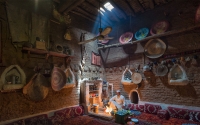
In the Kingdom of Saudi Arabia, 'al-Shabah,' also known by other names such as ' Shabat al-Nar ' and ' Shabat al-Daw ,' is a social tradition where Saudis gather around a fire, seeking warmth during the long winter nights when temperatures drop to zero °C or below, especially in the northern provinces of the Kingdom. 'Al-Shabah' is an ancient Arab heritage The Arabs have known 'Shabat al-Nar' (gathering around the fire) since pre-Islamic times,...
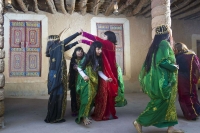
The game of Basal Busaila , also known as ' Bassil Bussila ,' is one of the traditional children's games in the Kingdom of Saudi Arabia. It is played in groups by children aged four to nine years. The game consists of two parts: the first part is friendly, where a specific chant is recited while the children are divided into two teams. In the second part, the two teams compete in a tug-of-war. The game of Basal Busaila explanation A group of children gathers to play the game of B...
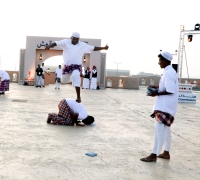
Ghleimet Game is one of the traditional games in the Kingdom of Saudi Arabia, specifically known in Qassim Province . It does not require a specific time to be played and is a group game involving a number of players. It is played in open areas and relies on the skill of intuition and quick wit. The game shares some characteristics with the game 'Hamad Hamad ,' but unlike 'Hamad Hamad,' Ghleimet does not require players to run and chase. Names of the Ghleimet Game Ghleimet g...
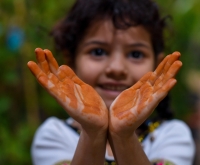
Henna in the Kingdom of Saudi Arabia is typically associated with weddings in some provinces , where women adorn themselves with henna designs on their hands and feet. The night before the wedding is called the 'Henna Night' or ' Ghomrah .' Women from the families of both the bride and groom gather at the bride's father's house to decorate the bride with henna designs on her hands and feet. During Eid al-Fitr and Eid al-Adha holidays in the Kingdom, women gather to...
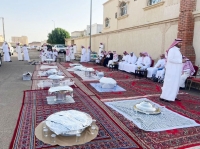
Eid al-Fitr Breakfast in the Kingdom of Saudi Arabia is the meal that Saudis eat on the morning of the first day of Eid al-Fitr. The provinces of Saudi Arabia vary in their preparation of breakfast tables, each showcasing its traditional dishes and foods. Eid breakfast in Riyadh Province The people of Riyadh celebrate Eid by gathering around the 'Eid spread', which includes popular and traditional foods, such as Jareesh , al-Qursan , and Markook . If Eid coincides with the winter seas...
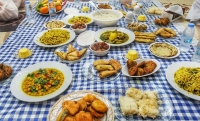
Ramadan Iftar in the Kingdom of Saudi Arabia is the first meal that a fasting person consumes during the holy month of Ramadan in the Kingdom. It commences with the Maghrib call to prayer, with family members gathering around the dining table. Iftar is followed by the Suhoor meal before the Fajr call to prayer. Unlike the conventional three-meal system distributed throughout the day, meals during fasting days begin sequentially in the evening, commencing with Iftar and concluding with Suhoor. F...
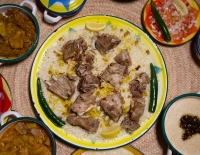
Suhur meal in the Kingdom of Saudi Arabia is the last meal that a fasting person eats before abstaining from food during the month of Ramadan and the days of fasting. Suhur begins after midnight and usually occurs early enough before al-Fajr (dawn) call to prayer. Family members gather to feast on the Suhur meal. In the evening, it is followed by the Iftar meal at the Maghrib call to prayer. As opposed to the traditional three meals distributed throughout the day, meals on fasting days begin ...
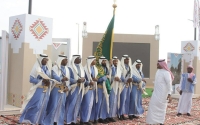
The Saudi Ardah Flag is a large banner that stands in the midst of rows of Ardah performers during the Saudi Ardah performance in official celebrations in the Kingdom of Saudi Arabia. It is called 'al-Bairaq' and is a fundamental component of the Ardah, with a width equal to two-thirds of its length. It features the spearhead, finial, and chains. The Saudi Ardah is performed with two rows of men opposite of one another, swords in hand, except for the flag-bearer, and is accompanied by...

Greetings in the Kingdom of Saudi Arabia is a local culture that the Saudis have inherited to express their desire to welcome someone they know. In other contexts, this greeting extends to someone they do not know, inviting them to their region or home. Hospitality culture in the Kingdom Guests in the communities of the Kingdom find great warmth and welcome, indicating a display of respect and a desire to show hospitality. There are various phrases that the host uses to honor and appreciate the...

Hospitality in the Kingdom of Saudi Arabia is one of the strong and unconditional human bonds that remained embedded in the Arabian Peninsula over centuries. It is an Arabic and mainly Islamic concept. It is valued by the Saudi society. Hospitality is perceived by all Saudis as a human virtue that must be honored. It is often viewed as a competition to welcome and entertain guests, whether acquaintances or strangers, in the most remarkable way. The modern meaning of 'guest' and '...

Al-Bukhor (Incense) is one of the special scents in the Kingdom of Saudi Arabia. It is a hospitality supply used for welcoming guests. People use incense on special occasions, weddings, and feasts, and agarwood incense is one of the prominent scents known in the local culture. Agarwood incense extraction Agarwood is extracted from perennial trees by cutting it in the middle and getting the wood from the inside. The wood types vary according to the trees' age, ...